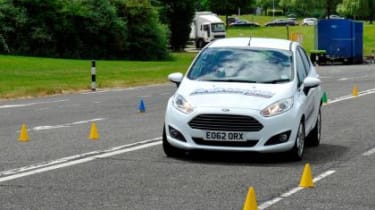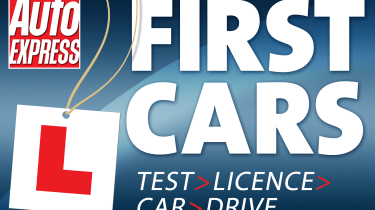Are intensive driving courses a good way to get a driving licence? We guide you through the options to help you pass the practical test.
Learning to drive can be a big help when it comes to getting the job you want, travelling to see family or friends, or taking trips away. One of the fastest ways to get a driving licence is to take an intensive driving course.
Whether you need to cram for the written theory test, practice for the hazard perception test or pass your practical test in the fastest possible time, a set of intensive driving lessons will help you to pass more quickly. But what’s involved? Let Auto Express guide you…
• Cheapest cars to insure
The first hurdle on the way towards passing your driving test is the written exam. The driving theory test has changed over the years, and today learners have to sit in front of a touchscreen to take the test. It takes less than an hour, and if you have bought one of the number of guides available to help you get through it or are using an online guide, then it should be pretty easy to pass.
After that, you have two years to take and pass your practical driving test. If you have time, then the best way to approach this is by booking lessons with a qualified instructor, who will give you tuition and advice on when you’ve reached a good enough standard to be able to pass your test.
If you already have a decent grasp of how to drive, whether it’s through lessons such as these or a good basic level of knowledge from watching and questioning friends or family, then an intensive course could be for you.
Instead of taking one or two lessons a week over several months, you do several hours of lessons at once to shorten the time needed to get your licence. These can vary from a few days to a couple of weeks, depending on your existing standard and natural skill.
What are intensive driving courses?
An intensive driving course crams all you need to know to pass your test into a short period of time with one-to-one tuition. By shortening the time between lessons you should need less time to catch up, and it can cost less overall too.
The content of the course will be exactly the same as a series of driving lessons, but it can often be tailored to focus on areas that the learner isn’t comfortable in, or is weakest.
Most of these courses offer help with the theory test for an extra fee while driving courses for drivers who only want an automatic transmission licence are available too. An automatic-only driving licence isn’t as much of a drawback as it once was, as an increasing number of cars, including hybrid, plug-in hybrid and all-electric models come with an automatic transmission as standard. However, it can be restrictive if you plan on hiring vans, or driving older cars at some point.
How long will an intensive driving course take?
The market for intensive courses is so diverse that the length of time an intensive driving course runs for is virtually up to you and your skill level. If you’ve already taken a few lessons and want a crash course ahead of a test, you can opt for a two-day course with just 10 hours of training.
PARTNERSHIP
Need to sell your car?
However, learning to drive intensively can be cheaper in the long run as you are less likely to forget the skills learned from one lesson to the next. Driving schools tend to offer cheaper rates for intensive courses too.
What are the negatives associated with intensive driving courses?
Clearly, packing all this learning into a short space of time can have some negative impacts. The biggest and most obvious is that you don’t rack up the same experience behind the wheel as you might if you’re having lessons over a longer period of time and practising in between with friends and family.
Likewise, if you cram all of your learning into an intensive driving course, the road type you’re on and the conditions are likely to be fairly static, taking out two big variables that come into play when you’re driving. The residential course can also be far away from the area where you will actually need to drive regularly when you pass, too.
• Practical driving test: how to pass
It’s probably best to take a short intensive course as final prep for your test once you’ve got a few hours of experience, or if you’ve previously had lessons and want a recap ahead of a test.
It’s also worth checking you’re not being over-charged for booking the theory or driving test when signing up for an intensive driving course, as some firms will try to charge a premium.
What about courses for driver training after you’ve passed?
Intensive driving courses aren’t just reserved for passing your test, there are plenty of courses available to further your driving skills.
Pass Plus is probably the most popular – as this focuses on motorway driving – but the Institute of Advanced Motorists also offers an assessment-based programme to develop your skills at the wheel. It’s worth considering one of these, as it may help reduce your insurance premiums – although the amount you save differs between insurers.
Another course that’s worth taking is trailer tuition. Companies can offer brief lessons on how to tow a trailer and execute manoeuvres such as reversing. Previously, anyone who passed their test from 1 January 1997 was required to pass an additional test if they wanted to tow a combination of car and trailer with a weight in excess of 3.5 tonnes – that’s about the same as a 4×4 towing a car trailer or horsebox, for example. This law is now in the process of being changed, but even when an additional test isn’t mandatory, tuition is still strongly recommended.
Beyond that there are also courses for driving in Europe, winter driving, off-road and track tuition, so passing your test can be just the start of your learning curve.
First Cars on Auto Express…
Everything you need to know about learning to drive, getting your driving licence and choosing your first car…
Learning to drive
- How to get your driving licence
- What is the highway code?
- Best intensive driving courses
Passing your driving test
- Driving theory test: everything you need to know
- Hazard perception test: what to expect and how to pass
- Driving test ‘show me, tell me’ quesions: hints and tips
- Practical driving test: how to pass
- Driving test pass rates explained
- Driving test aids product test
- History of the UK driving test
Getting your first car
- Best first cars for young drivers
- Cheapest cars to insure
- Cheaper car insurance for young drivers: our top tips
For all the latest car news, features, tips and advice, follow Auto Express on Twitter and like us on Facebook…
Source: Read Full Article







